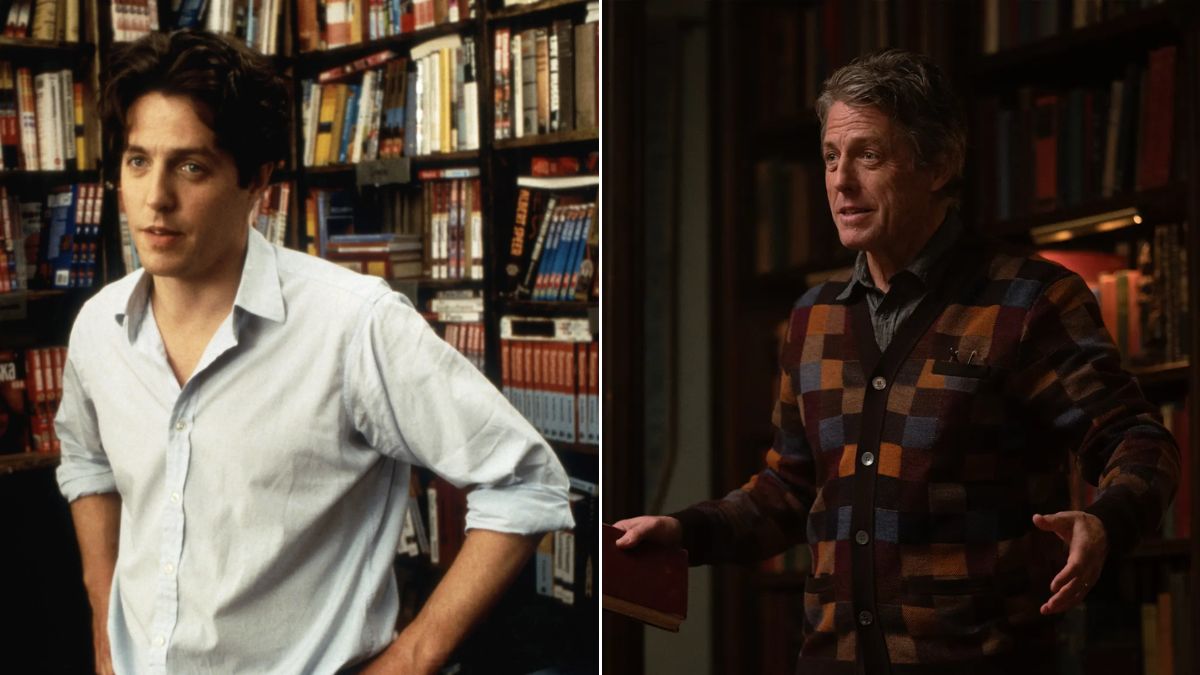‘Heretic’ works for the same reason ‘Notting Hill’ did
What does it take to charm strangers into trusting you? It's Hugh.

You’d think it heresy if I said that—other than being played by the same actor—William Thacker of Notting Hill and Mr. Reed of Heretic had one strikingly similar trait. However, 25 years apart, both of Hugh Grant’s characters lend conviction to two films from diametrically opposite genres for the same reason: Despite misgivings, it’s impossible not to take him up on his invitation when he offers you to come inside his house.
On December 9th, Notting Hill, Roger Michell’s beloved 1999 romantic comedy starring Julia Roberts and Hugh Grant, released. For it, Grant was nominated for Best Actor (Motion Picture Musical or Comedy) at the 2002 Golden Globes. 25 years later to the day, on the film’s 25th anniversary, Hugh Grant received his fifth Golden Globe nomination in the same category, but this time for a film that is diametrically opposite and markedly different than any he has been previously nominated for. Scott Beck and Bryan Woods’ Heretic is a psychological horror film, and Grant’s Mr. Reed is, well, only pretending to be a sweet old man.
Yet, there’s something about both these characters and their situations that is eerily alike… Both William Thacker of Notting Hill and Mr. Reed of Heretic encounter women—utter strangers—who they manage to convince to come to their house. While Anna Scott (Julia Roberts) is a famous Hollywood actor on the run from paparazzi in Notting Hill, Sister Barnes (Sophie Thatcher) and Sister Paxton (Chloe East) are Mormon missionaries desperate to convert a new member to their church in Heretic.
For all three women, Grant’s respective characters are strangers that they’re instinctually wary of. Also because… men. When William mistakenly spills juice on Anna and invites her over to his house across the street to clean up, or when the slightly ‘sus’ Mr. Reed tells the two young girls that his wife is in the house so they can safely come inside from the storm, you can see the misgivings that these women have at first. For the film’s premise to work, they must trust him enough to accept his invitation. And they do. However, it never—not even for a second—feels like their decision is forced simply because the plot demands it or because they had no other choice.
The reason it works effectively in both films that these women would end up trusting this stranger is majorly because Hugh Grant is so fantastically convincing when he is playing a charming, bumbling nice guy! His first impression gives off a sweet, pure-hearted, and helpful man who seems harmless because he often seems to bumble, fumble, and overshare, leaving the other person almost amusingly fascinated.
The result is an instant disarming of these women’s guards, putting them at ease, and allowing them to trust him, a stranger, and enter his house, even when precedent has told them this could go horribly wrong. Once inside, there’s the fact that he is witty, well-read, and eloquent, saying the right, or rather, honest things unsuspectingly, and with this endearing nervous energy, which feels like a refreshing respite from a harsher outside world that would probably not treat them so. It further piques their curiosity about him.
Of course, in Notting Hill, this is unintentional and organic; William doesn’t know he’s doing it, and doesn’t realise the effect it has on Anna and other women. He thinks saying “Whoopsadaisies” is embarrassing and is worried about how Anna might perceive him; every hesitation, every bit of foot-in-mouth or over-chattiness is caused by his nervousness around her. His vulnerability lets her reciprocate with her own. And it is these traits of William that bring Anna back to him even after the paparazzi incident outside his house. She finds that she trusts him even after what happened and believes his mistake was genuine. Or more importantly, that he is worth taking another risk for.
In Heretic, Mr. Reed is just as nonchalantly charming, saying exactly what the girls want to hear, peppered with bits of jokes and genuine goof-ups that might make them think, “Oh, he’s just a harmless goofy old man genuinely interested in our cause.” There’s a sharing of vulnerabilities here too, albeit in an attempt to distract—Reed opens up his house and confesses his misgivings about religion to them, which instantly puts the Sisters into defensive mode, taking it up as a challenge to convince him of their mission. It ends up distracting them, making them overlook the rather clear signs of his deceit. They too are willing to take the risk. He seems genuine, so what if they could actually convert him?
Of course, just like the difference between Fifty Shades of Grey and an episode of Criminal Minds, trusting a stranger ends well for Anna but not so much for Sisters Barnes and Paxton. But what’s undeniable is that Hugh Grant has a knack for acing these characters that feel custom-written for his brand of charm. He has proven his ability to play these men convincingly across genres, whether as a rom-com lead in Notting Hill, a pompous thief in Paddington 2, a murder suspect in The Undoing, or a diabolical psychopath in Heretic, the extent of whose insanity remains a shocker until the end.
It’s almost as if Mr. Reed is borrowing William Thacker’s personality and playing him so bloody well because he knows the objects of his thrall won’t, and don’t, stand a chance. I mean, we, the audience, didn’t!
Have a tip we should know? tips@themarysue.com